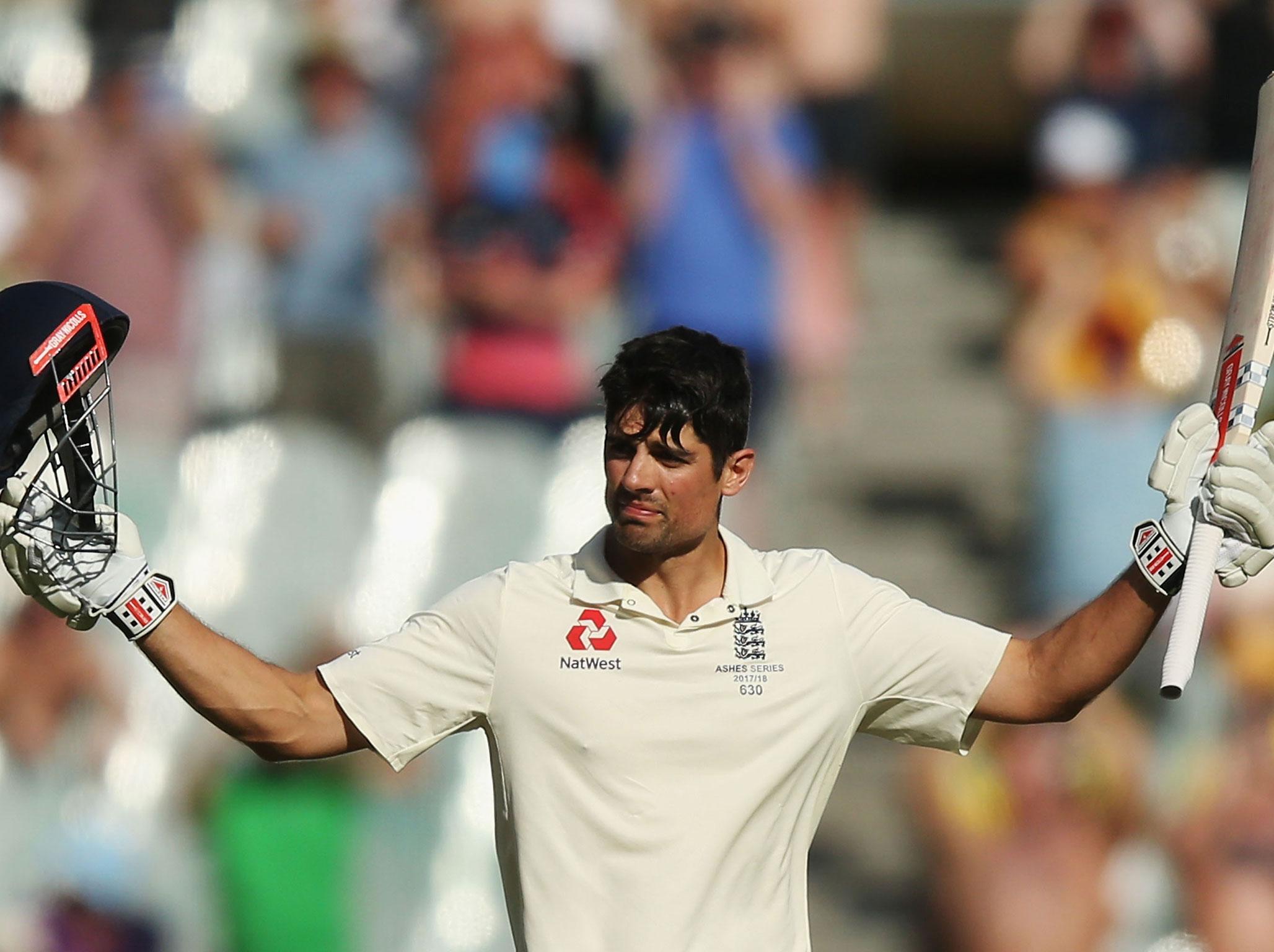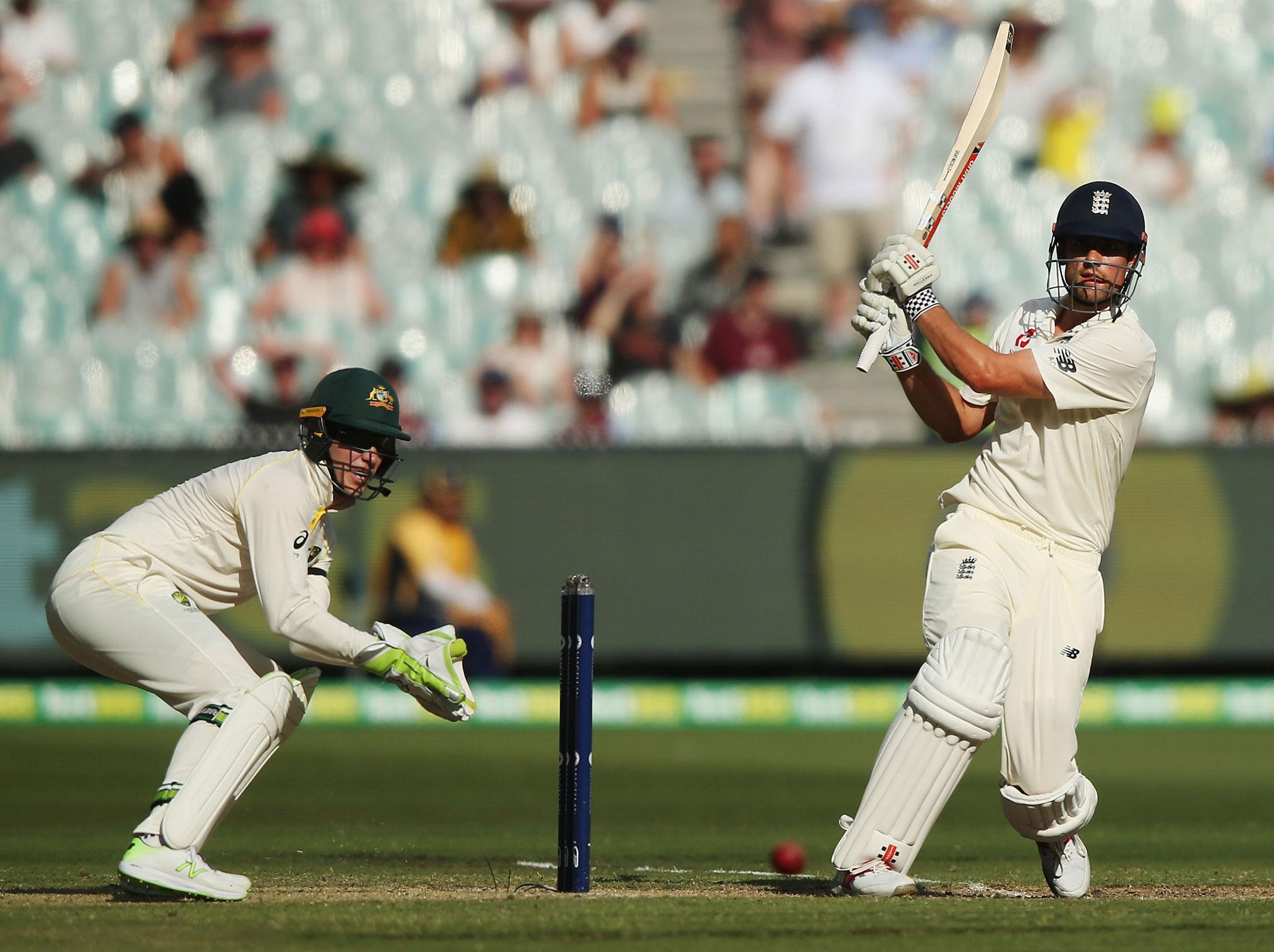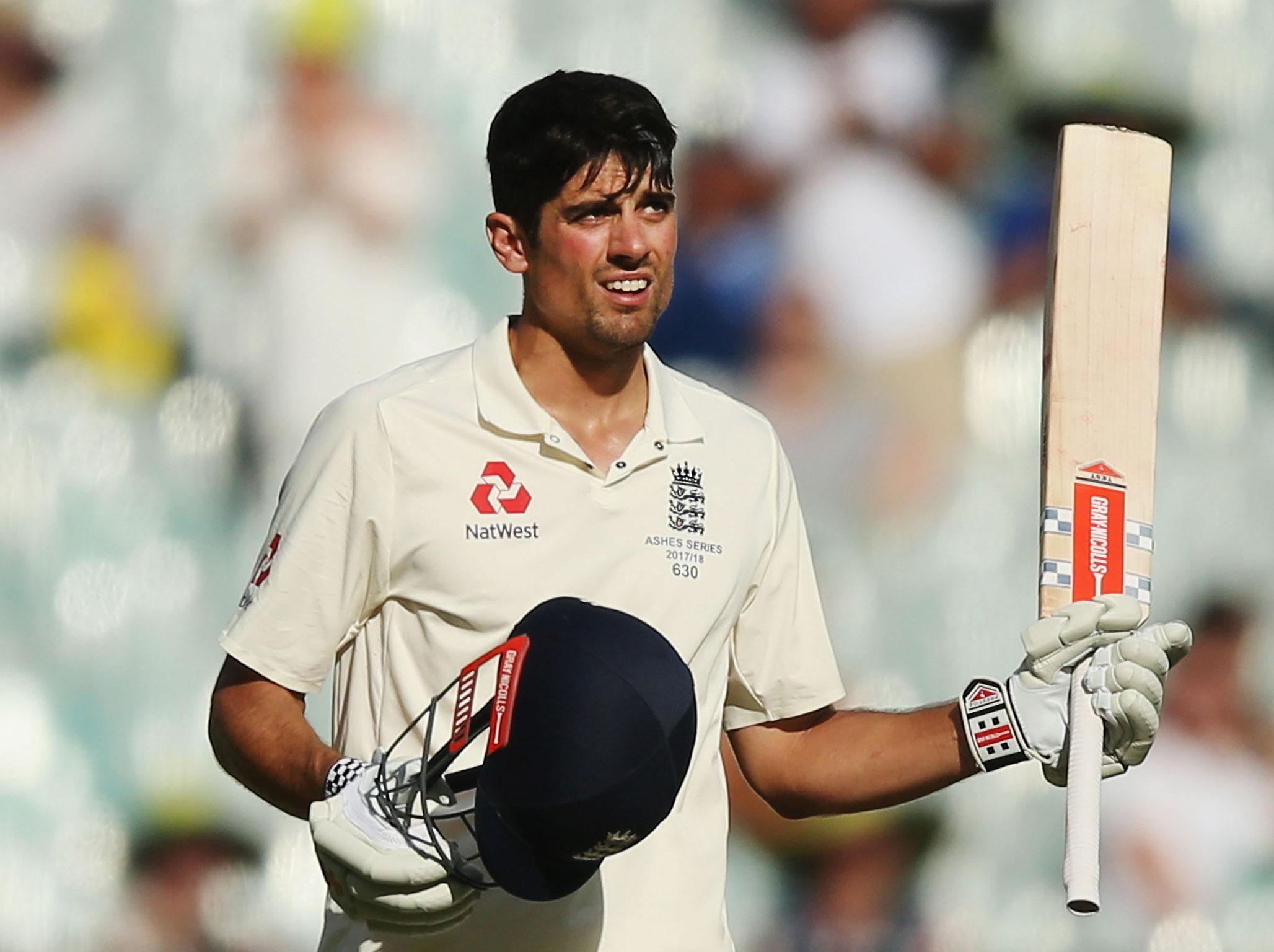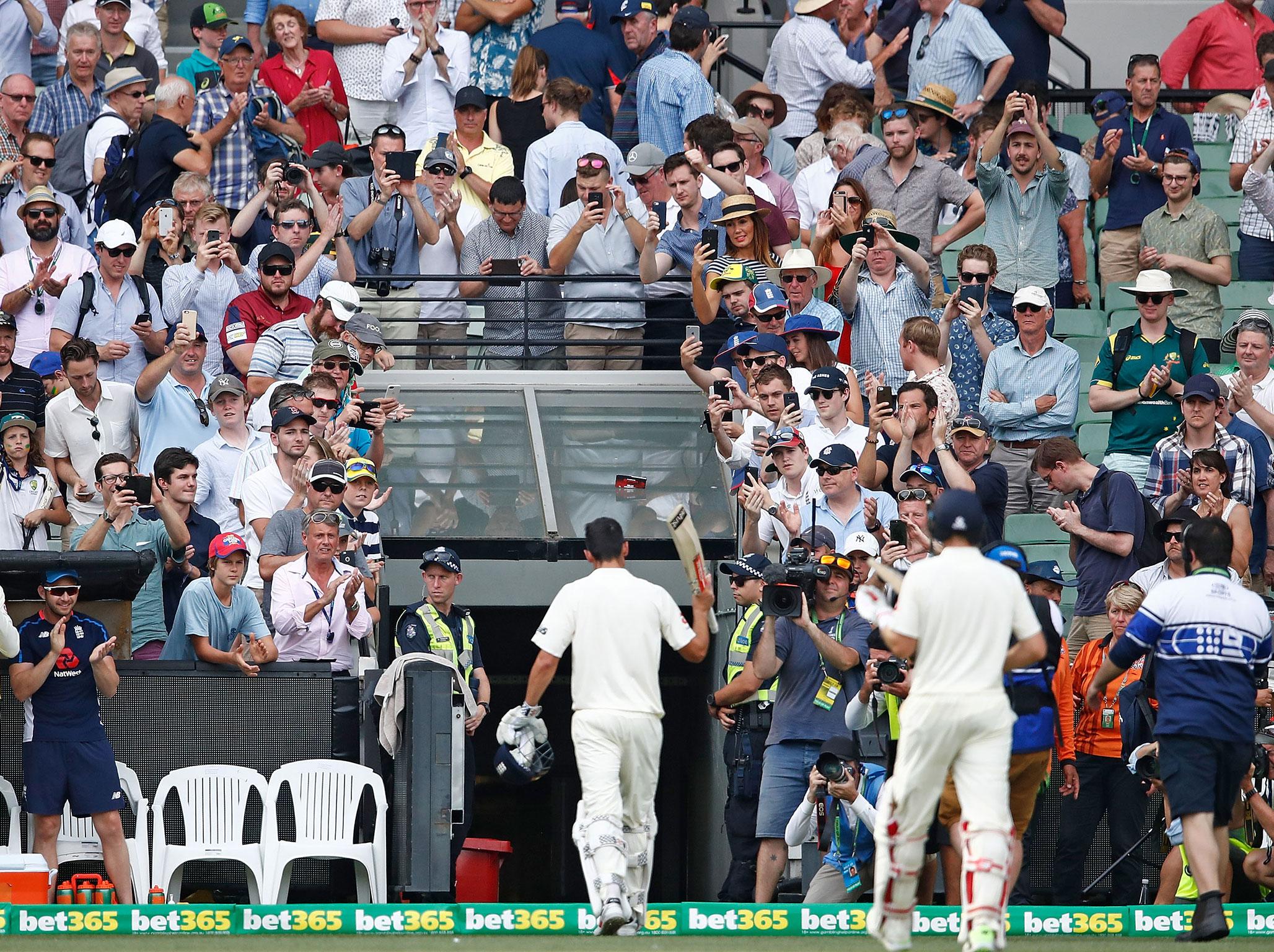Alastair Cook finally finds form as England enjoy best day of Ashes series
Australia 327; England 192-2: The former skipper passed three figures after Stuart Broad had earlier helped the tourists check Australia's momentum with the ball

He told you he was stubborn. On a sweltering day at the MCG, Alastair Cook made his belated entrance to the 2017-18 Ashes series, with an unbeaten century that was characteristically resilient and uncharacteristically fluent. Cook’s fifth Ashes century was his quickest of the lot, giving England a strong position in the fourth Test, offering genuine hope of reducing their series deficit to 3-1.
Throughout this tour, Cook has brushed off questions about his desire, shrugged off his lack of form, blithely ignored the pundits - paid and armchair - who have speculated that he might already be dreaming of the quiet farmer’s life. All of which may still be true, of course. But while you may question Cook’s ability or question his hunger, there is one trait he has never lost: the cold satisfaction he takes from doing the one thing you say he can’t.
With Joe Root (49 not out) in tow, Cook became the first Englishman to score centuries at each of the five main Australian Test grounds. It was his first century against Australia since that halcyon winter of 2010-11, and coming after Stuart Broad’s four wickets in sticky conditions inspired a very English-style collapse by Australia, England’s chances of emerging from this series with more than a suntan are looking better than they were 24 hours ago.
Caution is still advised, of course. Four years ago, England were well on top in Melbourne for most of the first three days, effectively 137-1 in their second innings, and still managed to lose by eight wickets. This winter, they were ahead of the game in Brisbane and Perth, and invariably managed to find a rake to step on. For a side that has found all sorts of colourful and creative ways to squander winning positions over the last couple of years, the situation remains uncertain at best.
But on what has been a gruelling and grim tour, Root’s men will happily take it. They would certainly have taken it when David Warner was flaying them to pieces on Boxing Day morning, or when Steve Smith was patiently assembling his latest bone-crushing masterpiece. Instead, against all the odds, it was England’s senior players who stood tall. And on the 17th day of the series, with the Ashes already gone, it was their all-time leading run-scorer who finally graced us with a contribution worthy of his reputation.
On a surface that demanded patience, with the ball increasingly sticking in the pitch, who better to bat on it than a man who has seen off 14 opening partners during his England career? Cook no longer dominates series the way he did at his peak, but he is still good enough to play decisive innings - the 88 against South Africa at The Oval, the 243 under lights against the West Indies. You just have to wait a little longer for them these days.
Earlier, it was Broad who took centre stage, proving once again that he is an entirely different proposition when the ball is moving around. Encouraged by the reverse nip on offer, Broad pitched the ball full, bowled aggressively, and earned his rewards. In the same vein as Cook, he may no longer dominate Tests the way he did at his peak, but he is still good enough to deliver decisive spells. You just have to wait a little longer for them these days.

Arguably, though, it was Tom Curran who delivered the decisive blow of the day. Before play, he speculated amusingly that having missed out on a first Test wicket when Warner was reprieved by a no-ball on day one, getting Smith instead would be a decent second prize. And just seven overs into the day, there he was: arms outspread, his second ball of the morning, tearing away towards backward point, scarcely believing. The wicket itself? A filthy long hop outside off-stump, dragged on. But nobody cared about that. Smith had departed for a meagre, derisory, insignificant 76. England celebrated like lottery winners.
Root was having a blessed morning. Woakes also struck in his first over, another cut dragged onto the stumps, this time off the bat of Mitchell Marsh. Remarkably Tim Paine went the same way, and in between Broad nipped out Shaun Marsh, who had clipped his way to 50 before being trapped stone dead by a Broad straightener from over the wicket.

The absence of Mitchell Starc gave Australia’s tail an elongated look, and without the cover provided by a senior batsman, it folded without too much fuss. Seven wickets in under two hours’ play, six of them bowled or LBW, and Australia had gone from 260-3 to 327 all out. It was England’s best bowling performance of the tour: tickled by fortune to an extent, but a glimpse of how this series might have panned out if England had played as well as they said they could.
This was the way they had intended things to go along: tight, disciplined bowling, Australian batsmen suckered by their own hubris, Australian bowlers gradually ground down into docility. Starc’s replacement Jackson Bird barely cleared 80mph at times. Pat Cummins was suffering from an upset stomach and well down on his usual pace. Josh Hazlewood is a far less threatening prospect when you can simply wait him out. England’s plan had finally come to fruition. Pity they were already 3-0 down.
They still had Nathan Lyon to contend with, of course. There wasn’t much turn for him out there, but his bounce discouraged the batsmen from sweeping, and his control of length offered little to drive. Eventually Mark Stoneman lost patience, tried to hit him back over his head, and was caught and bowler, an acrobatic leap and a right-handed grab. James Vince offered his customary James Vince contribution, an innings composed entirely of adjectives: a couple of exceptional cover drives and then the familiar misjudgment, an absence of footwork, LBW this time, 17 runs scored, another hour of everyone’s time wasted.

Meanwhile, Cook was cooking: seeing the ball big, picking the gaps, even unfurling the straight drive, which Cook only really brings out these days as a special treat on Christmas and birthdays (and given his birthday is December 25, this was both). Occasionally he rode his luck - there was the odd outside edge for four, a sharp dropped catch off Marsh that Smith fumbled twice at slip, a couple that fell short. But by and large this was comfortable, almost relaxing stuff for England, the perfect antidote to a fraught tour.
With Cook on 93, Smith brought himself on for the final over the day. It felt like a cunning plan. Instead, it was his seasonal gift to England. Cook hewed a full toss to the boundary, nudged off his legs for two to reach 99. Then, with the field up, he pulled a long hop through backward square leg to bring up his 31st Test century: drawing level with Steve Waugh in a most Waugh-like fashion.
Cook raised his arms aloft. Root embraced him. The songs of the Barmy Army filled the Melbourne skies. It had been a glorious evening. And though the urn may no longer be at stake, England’s Ashes tour finally has a little sunshine in it.
Join our commenting forum
Join thought-provoking conversations, follow other Independent readers and see their replies
Comments
Bookmark popover
Removed from bookmarks